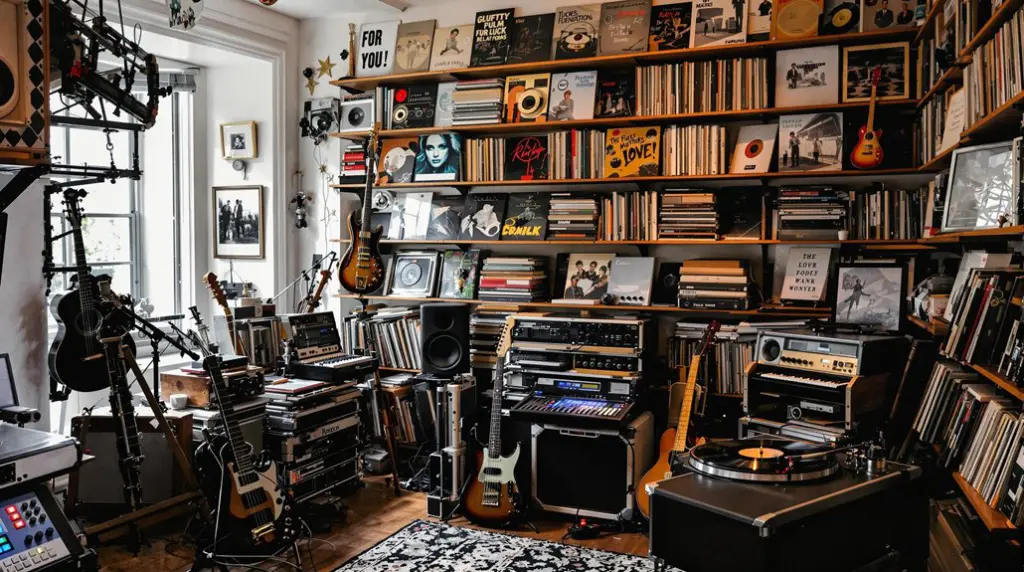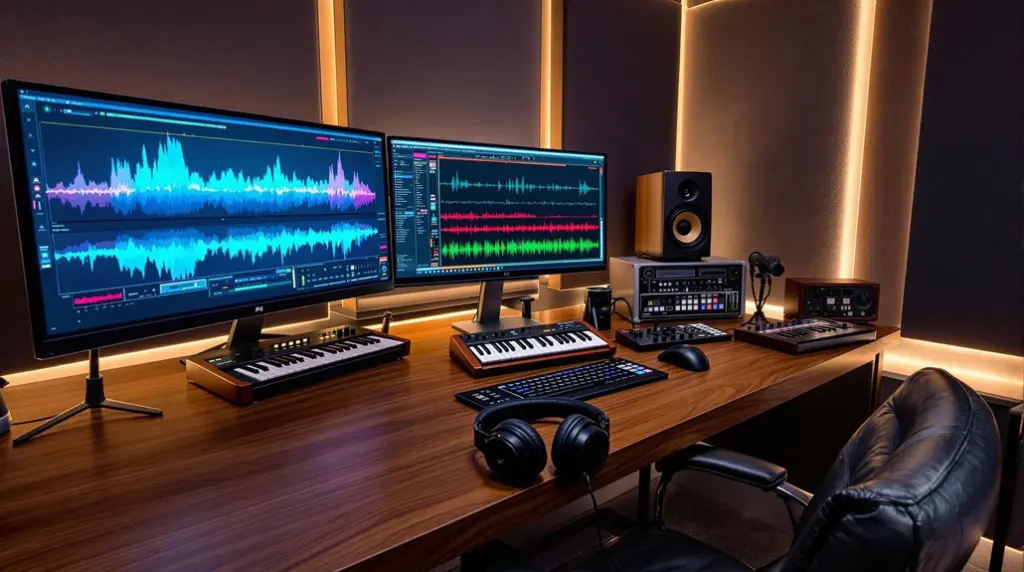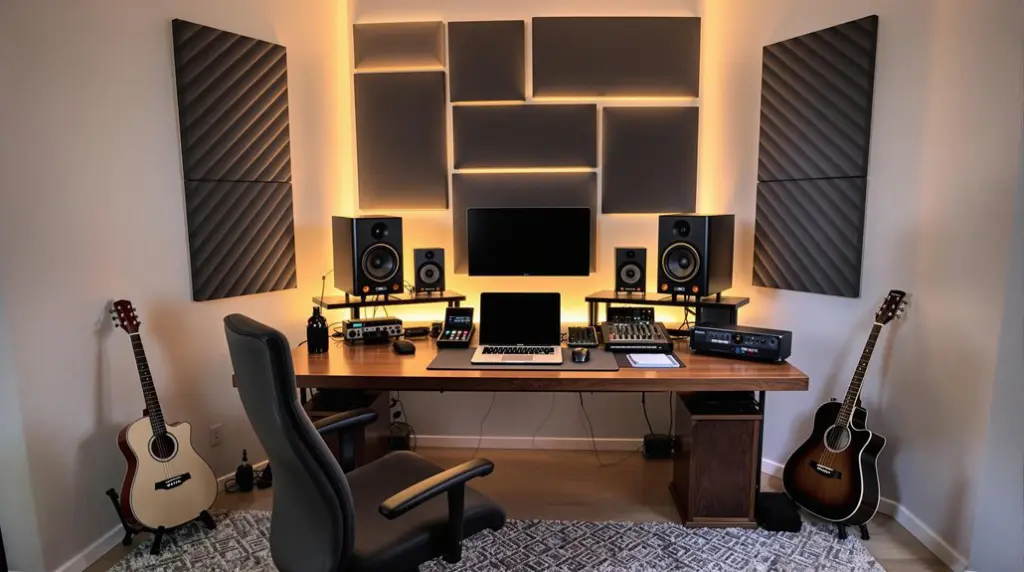In today’s AI-driven electronic music studios, you’ve got cutting-edge tools like iZotope’s Neutron, transforming sound with intelligent EQ and adaptive algorithms. Generative models, from MuseNet to Amper Music, let you explore creativity across genres. Vocal processing steps up with real-time pitch correction and enhancements for live and studio performances. Plus, AI mastering tools dynamically optimize your tracks for that perfect sound. These innovations not only streamline your workflow but also open up new territories of artistic expression. Explore how these technologies are customizing the auditory experience in unprecedented ways. There’s much to uncover about their potential impacts.
Key Takeaways
- AI-enhanced sound design tools like Synplant 2 utilize machine learning for advanced sound manipulation and texture generation.
- Automated mixing technologies such as iZotope’s Neutron feature intelligent EQ and adaptive learning for optimal sound quality.
- Generative music algorithms in tools like MuseNet and Amper Music facilitate rapid composition across various genres, enhancing creative potential.
- Real-time vocal processing technologies ensure pitch-perfect performances and studio-quality recordings, streamlining both live and studio settings.
- AI-powered mastering tools dynamically optimize tracks, offering a personalized mastering experience that respects the original artistic intent.
AI-Enhanced Sound Design
How can AI-enhanced tools like Magenta, Watson Beat, and Synplant 2 revolutionize your sound design process in electronic music production? These advanced tools integrate AI soundscaping techniques, fundamentally altering how you interact with sound creation. Magenta and Watson Beat exploit machine learning to generate complex patterns and textures, pushing beyond traditional boundaries of electronic soundscapes. Synplant 2’s Genopatch tab, specifically, offers an in-depth exploration into audio sample analysis, enabling a detailed level of sound manipulation previously unattainable without extensive manual intervention.
The future implications of these technologies are significant. They promise a new era where sound design becomes more intuitive, adaptive, and innovative, allowing you to explore sonic territories that were once either impossible or highly resource-intensive. However, this innovation brings ethical considerations to the forefront. As AI begins to play a larger role in creative processes, it’s essential to address the ownership of AI-generated content and the potential for homogenization of music styles. Ensuring that these tools enhance rather than replace human creativity will be vital in maintaining the cultural and artistic diversity in music production.
Automated Mixing Technologies
Automated mixing technologies like iZotope’s Neutron are transforming the way you optimize sound quality in music production. By leveraging AI, these tools analyze your tracks and employ mixed automation to dynamically adjust elements for a balanced output. You’ll find that intelligent EQ capabilities allow precision sculpting of frequency responses, ensuring each component sits perfectly in the mix.
AI algorithms are key here; they not only apply adjustments but also adapt based on the evolving characteristics of the track. This means that as you tweak your mix, the AI subtly shifts parameters to continuously refine sound clarity and balance. Imagine having an assistant who instantly understands your artistic direction and executes it flawlessly—this is the power of AI in mixing.
Looking forward, AI’s role in mixing is set to grow. Future technologies will likely incorporate adaptive learning systems that can take cues from your feedback, learning your preferences for more tailored automation. This integration promises even more artist-specific mastering solutions, pushing the boundaries of personalized production.
Moreover, tools like Sonible’s pure:bundle further streamline the mixing process. They simplify complex processing controls, making it easier for you to achieve professional-quality mixes without getting bogged down in technicalities. AI-driven mixing isn’t just about replacing the traditional mix engineer—it’s about enhancing your creative capabilities.
AI in Melody Creation
As you explore AI in melody creation, consider how essential generative models are in synthesizing new musical sequences from vast datasets.
AI harmonization techniques enable you to enhance these melodies by automatically adjusting them to different harmonic contexts, ensuring stylistic coherence across genres.
Algorithmic composition tools not only streamline the creative process but also expand your compositional capabilities by offering novel, data-driven approaches to music creation.
Generative Models for Melodies
Generative models like OpenAI’s MuseNet revolutionize melody creation in electronic music by offering diverse styles and genre capabilities. By leveraging AI creativity in melodies, you’re tapping into a vast reservoir of music theory advancements without manual intervention.
Tools like Amper Music and Google’s Magenta Studio utilize machine learning for composition, enabling you to experiment and innovate with melodic structures. These platforms don’t just mimic existing patterns; they introduce melodic innovation by generating unique and emotionally resonant melodies that challenge traditional compositional techniques.
With AI such as AIVA and Amadeus Code, you can explore new musical possibilities, ensuring your tracks stand out in a crowded market of electronic music producers. AI-driven melody creation is transforming electronic music studios, making them more creative and efficient.
AI Harmonization Techniques
Building on AI’s capabilities in melody creation, harmonization techniques now allow you to develop rich, harmonically complex layers that complement and enhance your original compositions. These AI-driven tools leverage algorithms that meticulously analyze music theory rules, ensuring that generated chord progressions and melodies not only sound pleasing but are also theoretically sound.
By integrating AI melody generation into your workflow, you’re equipped to explore new harmonic possibilities that may have been elusive or time-consuming to achieve manually. The AI algorithms adapt to user-defined parameters and styles, offering a personalized touch to the harmonization process.
This technical innovation greatly expands your creative horizon, making AI-driven harmonization an indispensable asset in modern music production.
Algorithmic Composition Tools
You’ll find that AI-driven algorithmic composition tools revolutionize how melodies, harmonies, and chord progressions are crafted in electronic music production. These tools utilize AI composition techniques, enhancing creative exploration by analyzing extensive musical data. This analysis allows for the creation of unique compositions that adhere to your preferred style and intricacies.
With customizable melody generation, you’re empowered to tweak parameters such as tempo, key, and style, facilitating musical experimentation that aligns seamlessly with your projects. This not only augments creativity but also greatly boosts productivity in your studio workflows.
| Feature | Benefit | Application |
|---|---|---|
| Customizable parameters | Tailored musical output | Studio production |
| AI-driven analysis | Unique, style-specific compositions | Genre exploration |
| Efficiency & creativity | Enhanced productivity | Creative processes |
Vocal Processing Innovations
You’ll find that real-time pitch correction is more than just auto-tune; it’s a sophisticated AI system that dynamically adjusts pitch errors in a vocalist’s performance to enhance musical accuracy.
AI voice synthesis isn’t just mimicking human tones; it creates entirely new voices that can sing in languages and styles previously unachievable by traditional artists.
Lastly, adaptive harmonic enhancements by AI enable richer, more complex musical textures by automatically adding complementary harmonies to the main vocal line based on the underlying musical context.
Real-Time Pitch Correction
How has real-time pitch correction transformed vocal processing in electronic music studios? This technology, integral in modern music production, guarantees that vocal tracks meet professional standards effortlessly. Here’s how it profoundly impacts both live performances and studio recordings:
- Live Performance Enhancement: Real-time pitch correction allows you to deliver pitch-perfect vocals during live shows, ensuring a seamless audience experience.
- Studio Recording Quality: In the studio, it provides the agility to fine-tune performances, enhancing the artist’s natural tone without over-processing.
- Instantaneous Feedback: Advanced algorithms offer immediate pitch adjustments, facilitating an interactive and adaptive recording process.
- Consistency Across Takes: It helps maintain vocal consistency throughout multiple takes, reducing the need for extensive post-production.
These tools are indispensable for producing high-quality, competitive music in today’s fast-paced industry.
AI Voice Synthesis
Building on the advancements in real-time pitch correction, AI voice synthesis tools like Musicfy and Lalals are setting new benchmarks in vocal processing in music production. These tools not only automate voice modulation but also extend creative possibilities with AI-generated lyrics, pushing the boundaries of vocal transformation technologies.
| Feature | Description | Impact on Music Industry |
|---|---|---|
| AI-generated vocals | Automates and enhances vocal tracks. | Increases production efficiency |
| Vocal manipulation | Allows drastic changes in voice characteristics. | Expands artistic expression |
| Ethical implications | Raises questions about authenticity and originality. | Sparks industry-wide debates |
| Creative possibilities | Enables unprecedented mixes and sounds. | Fosters innovation in music |
| Real-time processing | Delivers instant vocal adjustments. | Streamlines studio workflows |
Consider these tools as your collaborators, expanding your studio’s capabilities and ethical horizons simultaneously.
Adaptive Harmonic Enhancements
Leveraging AI, adaptive harmonic enhancements optimize vocal tracks by dynamically adjusting their harmonic structures for improved clarity and balance. These tools explore deeply into the nuances of sound, enabling a transformative approach to vocal timbre optimization and harmonic resonance analysis.
- Dynamic Adjustment: AI algorithms automatically adapt to the singer’s unique voice, modifying harmonics in real-time for excellent sound quality.
- Clarity Enhancement: Enhanced clarity through precise removal of muddying frequencies, ensuring the vocal cuts through the mix.
- Balance Control: Maintains an even tonal balance across different vocal ranges, preserving the artist’s emotional intent.
- Professional-Grade Output: Achieves studio-level vocal refinement that rivals traditional production techniques, empowering home studios to produce top-tier vocal tracks.
AI-Powered Mastering Tools
AI-powered mastering tools like iZotope and Landr revolutionize music production by employing machine learning to dynamically enhance sound quality. These platforms utilize advanced AI mastering techniques, incorporating vast databases of sound profiles to analyze and optimize your tracks. The integration of machine learning advancements allows for a highly personalized mastering experience, adapting to your specific sound and style preferences.
You’ll find these tools particularly groundbreaking due to their ability to foster artist collaboration. By analyzing and learning from a plethora of different music styles and artist-specific projects, systems like Ozone11 create tailored audio enhancements that respect and uplift the original artistic intent. This capability ensures that the final product isn’t just technically sound but also true to your creative vision.
Moreover, the continual evolution of AI algorithms means that with each track you master, the system becomes more attuned to your preferences. This adaptive learning process, potentially enhanced by future developments that could include real-time user feedback mechanisms, promises to further refine the personalization of mastering processes. You’re not just using a tool; you’re interacting with a platform that learns and grows with you, simplifying complex mastering challenges and pushing the boundaries of what’s possible in music production.
Generative Music Algorithms
While AI-powered mastering tools refine sound quality, generative music algorithms empower you to create original compositions by analyzing and employing vast data across various styles. These AI-driven music creation tools aren’t just about creating music; they’re reshaping how you approach songwriting and production. OpenAI’s Jukebox, Google’s Magenta, and IBM’s Watson Beat are at the forefront, leveraging algorithmic music generation to offer expansive creative possibilities.
Here’s what you need to know about these generative algorithms:
- Versatility: They can produce music in multiple genres, adapting to your specified style and preferences.
- Innovation: By analyzing large datasets, these tools continuously learn and evolve, pushing the boundaries of traditional music production.
- Efficiency: They streamline the creative process, generating complex musical ideas quickly which might take hours to conceptualize manually.
- Accessibility: Reducing the technical barrier for entry, they enable both novices and seasoned producers to explore new musical landscapes.
As these technologies advance, they’re not only automating aspects of music production but also inspiring the creation of new musical genres. With generative MIDI tools and AI-powered samples integrated into platforms like Ableton Live 12, your creative toolkit is more powerful than ever.
AI Integration in Live Performances
As you perform live, AI technologies are now capable of dynamically enhancing the music in response to audience feedback and environmental cues. This capability transforms how you interact with the crowd, ensuring that each performance is uniquely tailored to the moment’s vibe. AI systems analyze real-time data on audience reactions, using sophisticated algorithms to modulate tempo, volume, and even song selection. This seamless integration of technology enriches the experience of live improvisation, allowing you to respond not just to the crowd’s energy, but also to subtle shifts in the environment.
The boundary between performer and technology blurs as AI becomes an extension of your artistic expression. You’re no longer just playing music; you’re co-creating with a system that understands and reacts to the nuances of live performance. This revolution in live music setups empowers you to experiment with new forms of expression and audience engagement, pushing the limits of traditional performance dynamics.
With AI’s adaptive capabilities, each concert becomes a dynamic, interactive journey, where crowd interaction isn’t just about reaction—it’s about connection and mutual creation. This innovative integration marks a pivotal shift in how live music is delivered and experienced, heralding a new era of interactive performances.
Frequently Asked Questions
How Is AI Changing the Music Industry?
AI is revolutionizing the music industry by enhancing AI collaborations and curating personalized playlists. It’s streamlining production processes, from songwriting to mastering, making music creation more innovative and tailored to listener preferences.
Can AI Make Electronic Music?
Yes, AI can definitely create electronic music. It uses creative algorithms to blend genres and innovate sounds, autonomously generating tracks that push the boundaries of traditional music production techniques.
Will Music Producers Be Replaced by Ai?
AI won’t fully replace you, but it’ll reshape your role, emphasizing creative collaboration and raising ethical considerations. You’ll need to adapt, innovating alongside AI to leverage its capabilities in music production.
What Is the AI That Improves Music Quality?
AI that improves music quality includes tools like iZotope’s Ozone11 and Neutron, which enhance sound through genre adaptation and dynamic adjustment. They’re innovatively designed to analyze and optimize tracks for superior sound enhancement.
Conclusion
As you explore the latest in AI-driven electronic music studios, you’ll find that AI-enhanced sound design and automated mixing technologies are revolutionizing the way music is crafted.
AI’s role in melody creation and vocal processing innovations is reshaping artistic expression, while AI-powered mastering tools and generative music algorithms offer unprecedented precision and variability.
The integration of AI in live performances is setting new standards, ensuring that the future of music isn’t only innovative but dynamically interactive.




